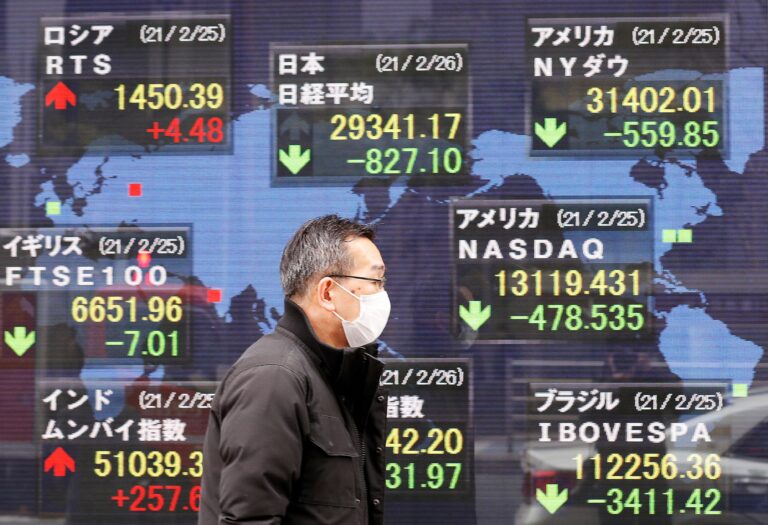Asian stock markets showed a mixed performance Friday as gains in the technology sector provided a boost to regional indices, while concerns over Japan’s recent interest rate hike weighed on its equities. Investors closely monitored developments in major economies amid ongoing inflation pressures and central bank policy shifts. The tech rally helped offset losses in some markets, underscoring the sector’s growing influence across Asia’s equity landscape. Meanwhile, Japan’s benchmark Nikkei index slipped as worries over tightening monetary policy dampened investor sentiment. This dynamic highlights the uneven impact of global financial trends on Asia’s diverse markets.
Asia Stocks Rally on Tech Sector Momentum Amid Global Optimism
Asian equity markets demonstrated resilience powered by substantial gains in the technology sector, reflecting a wave of global optimism following positive earnings reports and easing geopolitical tensions. Investors showed renewed confidence in semiconductor and software stocks, which led the rally in key markets such as South Korea, Taiwan, and Hong Kong. Notably, shares in major chipmakers surged, while cloud computing and cybersecurity firms attracted robust buying interest, underscoring the tech sector’s influential role in the regional market uplift.
Meanwhile, Japan’s Nikkei index faltered amid growing concerns over the country’s recent interest rate hike, which sparked fears of tighter monetary conditions potentially dampening corporate profits and consumer spending. Market watchers remain cautious as the Bank of Japan signals a more hawkish stance, contrasting with easing policies elsewhere. Below is a snapshot of the region’s major stock indexes and their movements during the latest session:
| Index | Change (%) | Sector Highlights |
|---|---|---|
| KOSPI (South Korea) | +1.8% | Tech, Autos |
| Taiwan Weighted | +2.3% | Semiconductors |
| Hang Seng (Hong Kong) | +1.5% | Tech, Financials |
| Nikkei 225 (Japan) | -0.9% | Financials, Industrials |
Japan Markets Pull Back as Investors Eye Implications of Recent Rate Hike
Japanese equities experienced a retreat today after the Bank of Japan’s recent decision to raise interest rates sparked concerns among investors about the potential impact on corporate earnings and consumer spending. The Nikkei 225 fell by 1.2%, weighed down by sectors most sensitive to borrowing costs, including real estate and consumer discretionary. Market participants are closely monitoring how this move will influence the country’s economic recovery amid lingering inflationary pressures.
Meanwhile, technology stocks in other parts of Asia provided a counterbalance, driving overall regional gains. Key markets such as South Korea and Taiwan posted solid advances supported by semiconductor firms and software companies. Below is a snapshot of today’s market performance across selected Asian indices:
| Market | Index Change | Notable Sector |
|---|---|---|
| Tokyo (Nikkei 225) | -1.2% | Real Estate |
| Seoul (KOSPI) | +1.0% | Technology |
| Taipei (TAIEX) | +1.3% | Semiconductors |
- Investors remain cautious amid uncertainty over future policy adjustments.
- Tech sector strength in neighboring markets supports broader regional sentiment.
- Focus on earnings reports expected next week to gauge sustained momentum.
Strategies for Navigating Volatility in Asian Equities Post-Interest Rate Changes
Investors looking to mitigate risks in Asian equities amid recent interest rate fluctuations should prioritize diversification across sectors demonstrating resilience, particularly technology. With tech stocks showing robust gains, especially in markets like South Korea and Taiwan, allocating capital to innovative companies with strong earnings outlooks can cushion portfolios against volatility. Additionally, maintaining a tactical approach to market timing-such as scaling into investments during dips-can help leverage short-term volatility for long-term gains.
Understanding the macroeconomic landscape is critical. For example, markets like Japan, which have reacted negatively to rate hike concerns, require a more cautious stance. Investors might consider hedging strategies or shifting towards dividend-yielding stocks and defensive sectors like consumer staples and utilities, which often perform better during interest rate increases. Below is a summary of key strategic considerations:
- Diversify sector exposure: Balance tech with stable defensive stocks.
- Employ tactical portfolio adjustments: Use dips to gradually increase positions.
- Consider currency risks: Volatility in yen and other Asian currencies can impact returns.
- Monitor central bank policies: Stay updated on rate decisions and inflation data.
| Strategy | Benefit | Example Sector/Instrument |
|---|---|---|
| Diversification | Reduces portfolio risk | Technology, Consumer Staples |
| Tactical Timing | Enhances entry points | Market dips, Pullbacks |
| Hedging | Protects against losses | Currency ETFs, Options |
| Monitoring | Informs proactive moves | Central bank announcements |
In Retrospect
As Asian markets closed mixed on Tuesday, tech sector gains provided support across several key indices, though concerns over rising interest rates weighed heavily on Japan’s bourses. Investors will be closely monitoring upcoming central bank announcements and economic data for further direction amid ongoing volatility.




